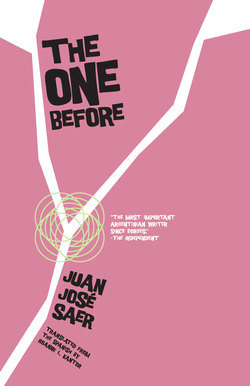Читать книгу The One Before - Juan José Saer - Страница 25
На сайте Литреса книга снята с продажи.
ОглавлениеBeaches
The riverbanks sparkle, slowly, like signals: they ripple. The ocean is one and the same, always. Only its borders move, in place, and when one edge advances, it is the entire ocean advancing. We stand before the sea so that it can contemplate us. But we are always on one side of the river as it passes us without regard, disdainful. Its beaches are an immobile caravan of umbrellas—red ones, blue, orange with white stripes, green, spotted. The yellow sand splays out before the caramel-colored water in a weak semicircle. Burned bodies pass by, running along the border of the water, and on the shore they form the tri-colored fringe of a most unusual rainbow: the yellow border of the sand, the tawny water, and the transparent strip, between the two, of water kicked up by the constant drum of feet that convulse the shore. Gazing after the running feet, not considering their prior upheavals that have already been erased, always keeping your eyes locked on the feet hitting the water, you can perceive the transparent, whitish fringe, like an imaginary dotted line, between the sand and the river. If this description seems overwrought, just remember that more stable fringes, so to speak, like the white and red fringes of umbrellas are also, if you will, in essence, imaginary and interrupted borders.
Now we have returned from the beach and it is two-thirty in the afternoon. We are sprawled out on the bed, in a cool white room protected by dark curtains; there is another body, also naked, next to our own. To that empty cavern comes no more than the memory, and that only for a moment, of overlapping shores, of immobile paths, white and deserted. Now we see trees with leaves covered in a white powder that resembles volcanic ash. Now we see nothing. We feel that the other body is hot, thick, and burnt. We imagine that our own must be, too. We weave together in an intermittent struggle, interspersed with moments of complete immobility, in which we see our shaggy hair, our knees, our genitals, which fit together, which complement each other, our feet which lie placid, gnarled, isolated at the far end of the bed; we compare the burnt parts of our bodies with the white ones, in the places where we usually wear our bathing suits. Afterward we tangle ourselves into the final battle. We had touched the furthest point, the muddy bottom of the river, passed the riverbed and arrived in a translucent zone beyond the convulsed, blinding bottom, a point full of light like the very center of a diamond. That light was so intense that nothing could be seen, not even the light itself. In that struggle we came back up, dense and spinning, like the body of a drowned man, toward the confused darkness of the bottom where we engaged in combat. Further up the surface of the world remains, with the beaches, the pathways, the crowds, the city, the dark room where our bodies, now, are sprawled out immobile on the bed, looking at the ceiling. At noon we had stopped on the shore, trying to hear the multiple murmurs of the water, the polyrhythm and polyphony at the heart of it’s enduring monotony. We could make out nothing in that murmur except that it sounded a bit unsettling to us because we could make out nothing in it. At the same moment, on the other side of the border, a stingray, clotted with nerves and cartilage, stretching out to enjoy the heat of the shallower water close to shore, believes all of a sudden it feels, in the great confusion of its subcutaneous sensations, a monotonous murmur emanating from the beach, a murmur which it does not realize is composed of many voices: the song of the world.
